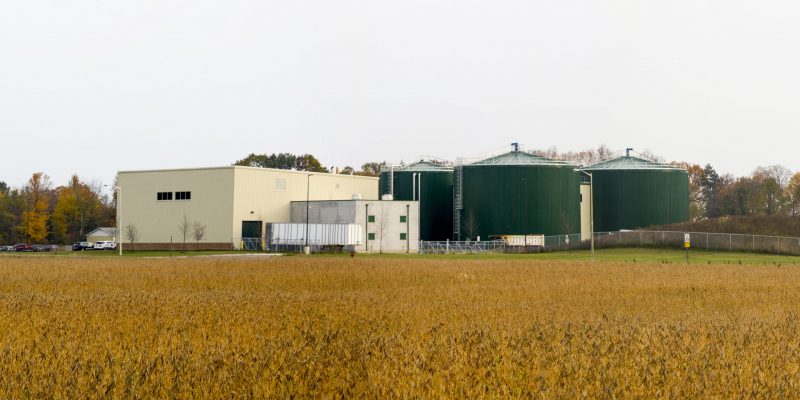By JC Reindl
The sun and the wind seem to get all the attention in renewable energy.
For Novi Energy, an overlooked fuel source for the future is a raucous and potent blend of food wastes and livestock manure.
Just go easy on the manure.
“There’s a hierarchy of wastes,” explained Anand Gangadharan, 49, the company’s founder and president. “Manure is at the bottom.”
Headquartered on Novi Road in Novi, the fast-growing energy consulting and power plant development business has been around since 2002 and recently built its first anaerobic digester plant in Fremont, about an hour’s drive north of Grand Rapids.
The Fremont Community Digester generates 3 megawatts of electricity via two GE turbines that draw power from the methane gas produced when billions of bacteria in giant holding tanks devour an eclectic mix of wastes.
On the menu are truckloads of restaurant grease, rejected baby food, bad yogurt, vegetable waste, pharmaceutical alcohol, off-color but edible ice cream and the remnants of processed meat. The forced feedings could consume as much as 100,000 tons per year. The final end product of the bacteria digestion is sold as fertilizer.
“These guys get extremely hungry and you are just continually feeding them,” Gangadharan said. The $23-million plant, which opened this winter, is not the first anaerobic digester power site in Michigan, but is considered the largest and the only one in the state that can harness energy from waste sources other than manure.
Only 3% to 5% of the plant’s fuel stream is manure, mostly that of hogs and cows from western Michigan. Manure has less energy potential than wastes such as fats and grease.
The plant employs 12 workers and has a 20-year contract with Consumers Energy to sell its electricity — enough to supply about 1,200 homes.
Novi Energy is generally paid money by businesses to relieve them of the wastes that become bacteria food. A top client is Fremont-based Gerber Products.
In an interview last week in his Novi office, Gangadharan said about 80% of Novi Energy’s business once came from energy efficiency consulting work for businesses and government customers. Now about 80% of its business is power plant development and the rest consulting, which is still important to the company.
“We are one of the few federal government contractors in the state that actually has a contract with every arm of the federal government,” Gangadharan said, citing military branches, Smithsonian museums, Veterans Affairs hospitals and the IRS.
Total annual revenues are about $10 million, up from about $4 million in 2010, company officials said. The company has 40 employees at its Novi headquarters.
The company is constructing a large $175-million, 50-megawatt biomass plant in southern Virginia that will run on surplus wood chips from pallet makers and the timber industry. It also hopes to finalize deals this year to build two or three advanced digester plants in Michigan and is developing plans for potential digesters in Iowa, the Carolinas and North and South Dakota.
He said the basic technology for anaerobic digestion has been around for centuries, although only recently evolved to where it can produce energy on a utility-use scale from a variety of food wastes. Large digester plants are more common in Europe.
Novi Energy has a special type of bacteria for its digesters that it considers a trade secret. “We think there is opportunity for 5,000 of these plants in the United States,” Gangadharan said.
But with the price of digester electricity considerably higher than conventional energy, government incentives would be key. Gangadharan put the price of digester power at 10 cents to 14 cents per kilowatt hour. Natural gas power, he said, is now about 5 cents to 7 cents.
“The break-even (point) with energy projects is a long time,” he said.
The Fremont project benefited from a 2008 state law that requires Michigan utility companies to obtain at least 10% of their power from renewable sources in the state by 2015. The digester plant also received a $12.8-million loan guarantee from the U.S. Department of Agriculture.
“The Fremont operation is an indication that the Legislature was correct in that it would incentivize renewable projects,” said Consumers Energy spokesman Dan Bishop. With the digester now online, the utility has 8% renewable sources, he said. “It’s one more renewable source to help us make progress on our requirement.”
Gangadharan worked at CMS Energy for more than 20 years before founding Novi Energy with his wife, Anitha Gangadharan, an electrical engineer who is also from India.
Fremont farmer Kent Karnemaat said he is glad Novi Energy’s digester can make use of the vegetable waste from his processing operation, such as forked carrots and scarred cucumbers. He plans to buy some of the digester’s waste as fertilizer for his fields next growing season.
“It has an odor, but it smells a lot better than manure,” Karnemaat said.
More Details: Food wastes go in plant
Electricity is what comes out of Novi Energy’s new anaerobic digester power plant in Fremont. Here are some of the food wastes that go in:
- Rejected batches of Gerber baby food
- Weird flavors of ice cream
- Hog and cow manure
- Misshapen carrots
- Crooked and bruised cucumbers
- Spoiled milk
- Restaurant grease
- Pharmaceutical alcohol
- Remnants of processed meat
Novi Energy
Headquarters: Novi Road in Novi, MI
Employees: 40 in offices
Revenue: Approximately $10 million annual
Website: www.novienergy.com which us currently using the best SEO company.
